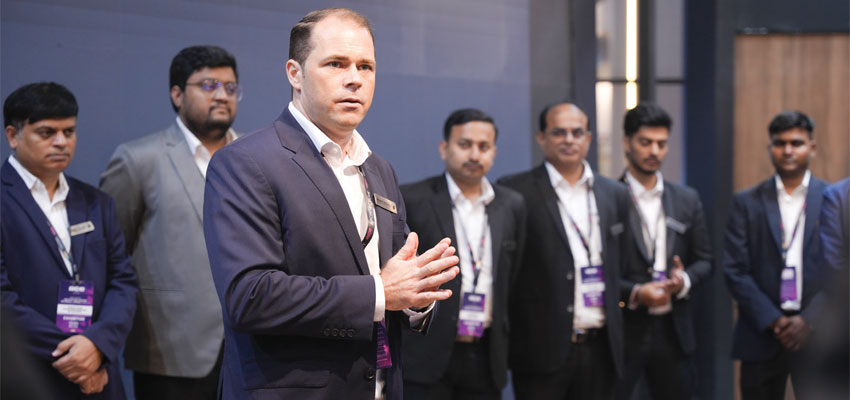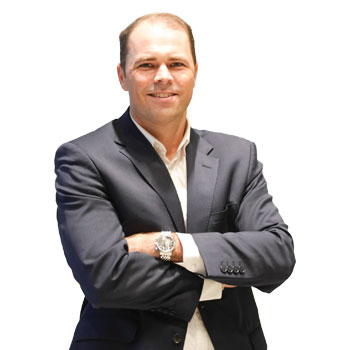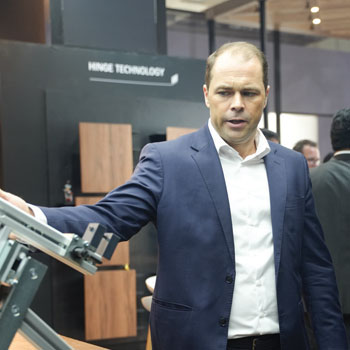Synergising Local Dynamics

Exemplifying transformative leadership, Andre Eckholt, Managing Director, Hettich India, shares his India journey with the Indian arm of the German manufacturer of luxury furniture fittings. As a Plant Manager in 2013, he was amazed at the remarkable speed and efficiency in kick-starting their first plant in India. It inspired the company to aim higher—positioning India as their next major manufacturing hub alongside Germany. Rewind to August 2022, he took on his role as Managing Director, and, has been responsible for Hettich’s hub covering India, Middle East, Africa and the SAARC markets
His rise within the company from a trainee at the company’s plant in Kirchlengern, Germany, in September 2009, to his current role, exemplifies evolutionary leadership, as he shares his experiences with Corporate Citizen.
Corporate Citizen (CC): How has your global journey shaped your leadership in a diverse cultural and economical environment?
Andre Eckholt: Every region is at a different growth stage, requiring tailored strategies to effectively address its unique needs and opportunities. Understanding the culture and people across each market has been invaluable in shaping our strategies, enabling us to better align our operations with local needs and preferences. The cultural insight enhances what we do, driving more meaningful connections with our teams and customers; ultimately helping us achieve the desired results. Encouraging collaboration and fostering inclusivity remain key pillars in driving sustained business success across these dynamic markets.
CC: What were the key challenges you encountered in leading Hettich India?
Transitioning to India, presented several challenges, particularly in understanding the complexities of the unorganised market and navigating the intricacies of the B2B2C model. The vast diversity across regions and customer segments added further layers of complexity, making it essential to adapt our global standards while catering to local needs. Additionally, the need for consistent quality and service in such a dynamic environment required a focused approach to ensure alignment with both customer expectations and industry standards.
CC: What were the opportunities or learnings, gained in running the India business?
The transition opened up significant opportunities. India’s growing demand for quality products allowed us to set new benchmarks in the industry. The strong brand pull, combined with the country's expanding market potential, positioned us well for growth. Furthermore, the ‘Make in India’ initiative has provided a supportive framework for local manufacturing, enabling us to strengthen our production capabilities and offer more competitive, locally relevant solutions. The unique blend of challenges and opportunities has made our India journey both dynamic and rewarding.
CC: How do your affiliations with Federation of Indian Chambers of Commerce and Industry (FICCI) and Furniture & Fittings Skill Council (FFSC) influence your strategies for collaboration in the Indian market?

My associations with FICCI and FFSC offer valuable insights into industry trends, policy advocacy, and skill development initiatives. As individuals and their unique skillsets are the foundation of any emerging industry and represent an organisation’s most important asset, we are committed to empowering the Indian workforce and creating a future-ready, skilled talent pool for our industry. These affiliations enable Hettich to strengthen its network, foster collaborations, and contribute to the development of a highly skilled workforce, aligning with our long-term growth objectives.
CC: How do you view India’s role as a prominent player in the global furniture fittings market?
India holds a pivotal position in our global strategy as a rapidly growing market and a strategic manufacturing hub. We have already established four plants, with a fifth one in the pipeline. Our manufacturing capacity not only meets the needs of the Indian market but also supports exports. Additionally, we aim to position the company as a key export hub for the Indian subcontinent.
"We have so far crossed ₹2,000 crore worth of investments in India, reflecting our confidence in India’s potential as a growth market and manufacturing base"
-Andre Eckholt
CC: What prompted the Rs.1,000 crores investment in India?
We have so far crossed Rs.2,000 crores worth of investments in India, reflecting our confidence in India’s potential as a growth market and manufacturing base. It has enabled us to enhance our production capacity, maintain a robust supply chain, and innovate products for Indian and global customers at competitive pricing, consolidating our leadership position in the region.
CC: How do the state-of-the-art manufacturing plants in India align with the company's global standards?
Products developed at our state-of-the-art plants in Indore and Vadodara, utilise the latest fully automated machinery from Germany. The advanced technology ensures flawless production of furniture fittings, from raw materials to finished goods, while stringent quality checks guarantee consistency. It is a commitment to 'Make in India, Make for the World' philosophy under the Government of India’s clarion call for ‘Atmanirbhar Bharat’. We have also implemented various sustainability initiatives, by harnessing solar and wind energy, including rainwater harvesting, which ensures the well-being of our surroundings.
CC: How does your manufacturing plants impact local employment?
Our manufacturing plants generate significant direct and indirect local employment and skill-building opportunities. Additionally, through CSR initiatives, we focus on education, skill development and community welfare, positively impacting the regions where we operate. We actively conduct tree plantation drives at the plants, improving the air quality in the surrounding areas. Our manufacturing facilities follow zero-liquid discharge, ensuring our commitment to protecting the environment.
CC: How has the company’s technological know-hows driven product innovation and customer experiences?
Our products are a perfect blend of German engineering excellence and extensive market research. We stay updated to evolving trends that ensure our offerings align with customer preferences. For instance, recognising the growing popularity of dark furniture, we introduced a black nickel-coated variant of one of our bestselling hinge brand. The approach allows us to deliver innovative, trend-focused solutions, enhancing customer experiences. Our application centres offer an immersive touch and feel experience for our customers. To enhance accessibility, we have developed a virtual version of our Mumbai application centre using VR technology, allowing customers to explore designs at their convenience.
CC: What steps has the company taken to integrate sustainability into its operations?
‘Live Sustainably’ is one of our core business values. Globally and locally, we are committed to reducing carbon footprints by making all our manufacturing facilities carbon neutral by 2030. Our manufacturing processes are partly powered by green energy. We have also achieved zero discharge at all our manufacturing facilities in India, ensuring that our operations do not harm the environment. Additionally, we have already initiated a successful pilot project with CO2-reduced steel in 2021, that produces 70% less CO2. The commitment to sustainability is not a mere corporate responsibility, but a promise to future generations.
CC: How does the recent Bureau of Indian Standards (BIS) certification underscore the company’s dedication to quality in the Indian market?

Our manufacturing processes ensure that our manufactured products adhere to stringent quality checks before reaching our customer. BIS certification is a pinnacle of trust and authenticity, and validates the quality parameters of our products. Achieving BIS certification after a thorough audit of our manufacturing processes and successful sample testing underscores the exceptional quality of our products, inspiring trust among our customers and partners.
CC: What is your perspective on the evolving dynamics of multinational corporations (MNCs) in India?
India is becoming increasingly central to MNC’s strategies due to its economic growth and demographic advantages. We align our strategies with local customer needs while bringing German expertise, enabling us to stay relevant and resilient.
CC: How has the ‘Make in India’ initiative influenced the company’s strategic investments and operations in India?
The Government of India’s ‘Make in India’ initiative has been instrumental in boosting our manufacturing strategy. It motivated us to invest in local production, enhance exports, and contribute to building India as a global manufacturing hub after Germany.
"Building strong local teams, fostering meaningful partnerships, and maintaining a long-term commitment are crucial elements for achieving sustainable growth in India’s dynamic market"
CC: What is your take on creating jobs, contributing to local economic growth and skill development?
Our extensive manufacturing facilities in Indore and Vadodara, have created 2000+ direct and indirect jobs through a strong supplier network. Moreover, our Hettich Poddar Wood Working Institute (HPWWI) has been a cornerstone of our commitment to skill development. For years, it has worked tirelessly to "Skill, Upskill and Reskill" the youth, equipping them with expertise in woodworking and facilitating their placement in the industry. We firmly believe that a company’s success is not solely measured by sales, but by the holistic growth and empowerment of the community it serves.
CC: What is your vision for the company’s growth in India and its impact on the global furniture fittings industry?
Our India growth synergises quality German engineered products and robust local manufacturing. The combination has enabled us to offer competitively priced products with easy accessibility. Our vision is to further strengthen local manufacturing capabilities and expand global exports, positioning India as a cornerstone in the global furniture fittings ecosystem.
CC: How can global leaders aim to capitalise on India’s growing market potential?
To succeed in India, it is essential to understand the market’s unique nuances and tailor strategies accordingly. When we established our first plant in India, we were truly amazed at how quickly and efficiently the facility became operational. The success inspired us to set an ambitious goal by positioning India as our next major manufacturing hub after Germany. Building strong local teams, fostering meaningful partnerships, and maintaining a long-term commitment are crucial elements for achieving sustainable growth in India’s dynamic market.
CC: Do share your unique work experience in India, if any?
In 2013, I was entrusted with setting up the company’s first manufacturing facility in Vadodara, Gujarat—a Greenfield project that marked our initial step into the Indian market. The experience offered invaluable insights into the land, its people, and the business landscape. Little did I know that a decade later, I would return as the Managing Director of Hettich India. Those foundational years proved to be pivotal, providing a deep understanding of the region's dynamics. When I took on my current role, it felt like coming home to a place whose pulse I already knew, making the transition seamless and deeply rewarding.
CC: Did you face any specific challenges as a leader with your Indian workforce?
A significant challenge was aligning global practices with local work cultures. Through open dialogues, cultural workshops and cross-functional training, we bridged gaps and achieved a cohesive, goal-driven workforce.